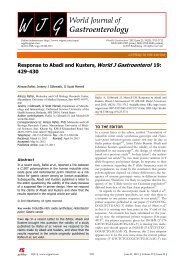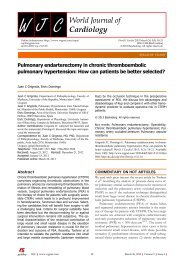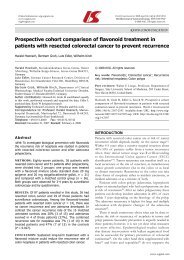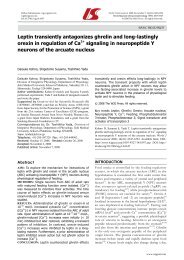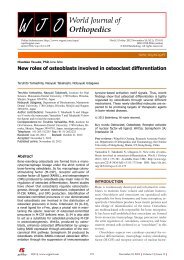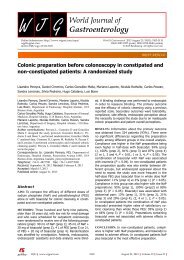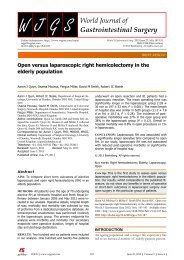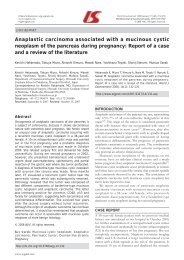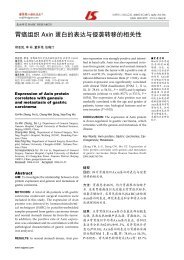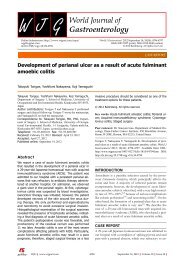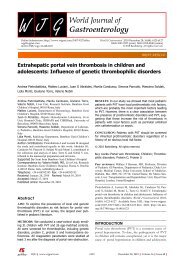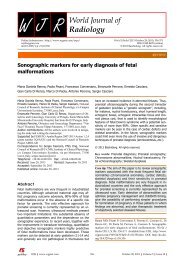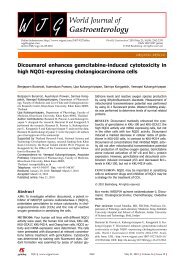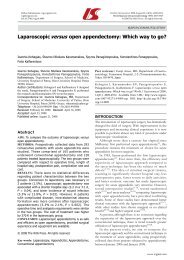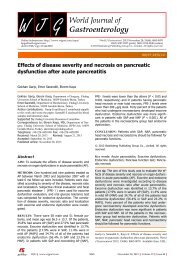World Journal of Gastrointestinal Pathophysiology
World Journal of Gastrointestinal Pathophysiology
World Journal of Gastrointestinal Pathophysiology
You also want an ePaper? Increase the reach of your titles
YUMPU automatically turns print PDFs into web optimized ePapers that Google loves.
Chebli JMF et al . Acute pancreatitis<br />
initial oral refeeding diet.<br />
After analyzing the data in recent studies reviewed<br />
above, we can state that in patients with mild AP, the<br />
nutrient composition and the physical features <strong>of</strong> meals<br />
do not appear to change the clinical course <strong>of</strong> disease.<br />
Hence, a very interesting question arose: would we be<br />
able to match the interesting clinical data to those found<br />
in physiological studies [11,12] that show slower pancreatic<br />
response and higher pancreatic enzyme output in response<br />
to a high-fat solid diet with greater caloric loads?<br />
It is possible that the injured pancreas can have an attenuated<br />
response to feeding stimuli. So, we can speculate that<br />
the basal and stimulated pancreatic enzyme secretion, in<br />
particular pancreatic secretory response to CCK, may be<br />
woken markedly early, after the onset <strong>of</strong> AP, as have been<br />
shown in experimental studies [13,14] . Evidence allows us to<br />
conclude that in human pancreatitis the injured pancreas<br />
may be less responsive to stimulation by food than previously<br />
considered [15,16] .<br />
In the last two decades we noticed that several investigations<br />
tried to test the tolerance to food stimulation<br />
<strong>of</strong> the inflamed gland after an episode <strong>of</strong> mild AP. Initially<br />
on a longer fasting period followed by an early oral<br />
refeeding with clear liquid and a low fat diet. Moreover,<br />
the evidence that a full solid meal can be used in such<br />
circumstances with better tolerance, demonstrated that<br />
increased nutritious calories and a reduction in therapy<br />
costs can occur. However, the findings <strong>of</strong> Moraes et al [10]<br />
lead us to suppose that we have now found the answer<br />
to an old question. A full solid diet is well tolerated by<br />
the majority <strong>of</strong> patients and results in a shorter length <strong>of</strong><br />
hospital stay without abdominal pain relapse, thereby saving<br />
health care resources. Petrov [17] pointed out in Moraes<br />
study that the rate <strong>of</strong> feeding intolerance was around<br />
20%, regardless <strong>of</strong> the type <strong>of</strong> initial diet used for oral<br />
refeeding and this was unacceptable both from the perspective<br />
<strong>of</strong> patient’s quality <strong>of</strong> life and the cost <strong>of</strong> treatment.<br />
However, this rate <strong>of</strong> intolerance was observed<br />
also in other trials [5,6] and it seems a rule in oral refeeding<br />
<strong>of</strong> patients with mild AP.<br />
CONCLUSION<br />
In summary, identifying patients who are at high risk <strong>of</strong><br />
developing pain recurrence during oral refeeding due to<br />
more intense or persistent pancreatic inflammation on<br />
the day before refeeding (for example, those patients presenting<br />
with a substantially increased serum lipase concentration<br />
and high level <strong>of</strong> C-reactive protein) [6] , might<br />
allow a timely implementation <strong>of</strong> more specific therapeutic<br />
measures for this subgroup <strong>of</strong> patients such as nasojejunal<br />
tube feeding. Thus further clinical investigations are<br />
necessary to improve the identification <strong>of</strong> these subgroup<br />
patients and to establish an adequate strategy to prevent<br />
their pain relapse. To the best <strong>of</strong> our knowledge it seems<br />
that when considering full solid diet refeeding, we do not<br />
need to be afraid <strong>of</strong> “wakening the sleeping tiger. ” The<br />
in-hospital time can be, saving costs.<br />
WJGP|www.wjgnet.com<br />
REFERENCES<br />
1 Banks PA. Medical management <strong>of</strong> acute pancreatitis and<br />
complications. In: Go VLW, DiMagno EP, Gardner JD,<br />
Lebenthal E, Reber HA, Scheele GA, editors. The pancreas:<br />
biology, pathobiology, and disease. New York: Raven Press,<br />
1993: 593-611<br />
2 Banks PA, Freeman ML. Practice guidelines in acute pancreatitis.<br />
Am J Gastroenterol 2006; 101: 2379-2400<br />
3 Meier R, Beglinger C, Layer P, Gullo L, Keim V, Laugier R,<br />
Friess H, Schweitzer M, Macfie J. ESPEN guidelines on nutrition<br />
in acute pancreatitis. European Society <strong>of</strong> Parenteral and<br />
Enteral Nutrition. Clin Nutr 2002; 21: 173-183<br />
4 Reber HA. Food, fat, and the inflamed pancreas. Clin Gastroenterol<br />
Hepatol 2007; 5: 915-916<br />
5 Lévy P, Heresbach D, Pariente EA, Boruchowicz A, Delcenserie<br />
R, Millat B, Moreau J, Le Bodic L, de Calan L,<br />
Barthet M, Sauvanet A, Bernades P. Frequency and risk factors<br />
<strong>of</strong> recurrent pain during refeeding in patients with acute<br />
pancreatitis: a multivariate multicentre prospective study <strong>of</strong><br />
116 patients. Gut 1997; 40: 262-266<br />
6 Chebli JM, Gaburri PD, De Souza AF, Junior EV, Gaburri<br />
AK, Felga GE, De Paula EA, Forn CG, De Almeida GV, De<br />
Castro Nehme F. Oral refeeding in patients with mild acute<br />
pancreatitis: prevalence and risk factors <strong>of</strong> relapsing abdominal<br />
pain. J Gastroenterol Hepatol 2005; 20: 1385-1389<br />
7 Petrov MS, van Santvoort HC, Besselink MG, Cirkel GA,<br />
Brink MA, Gooszen HG. Oral refeeding after onset <strong>of</strong> acute<br />
pancreatitis: a review <strong>of</strong> literature. Am J Gastroenterol 2007;<br />
102: 2079-2084; quiz 2085<br />
8 Jacobson BC, Vander Vliet MB, Hughes MD, Maurer R, Mc-<br />
Manus K, Banks PA. A prospective, randomized trial <strong>of</strong> clear<br />
liquids versus low-fat solid diet as the initial meal in mild<br />
acute pancreatitis. Clin Gastroenterol Hepatol 2007; 5: 946-951;<br />
quiz 886<br />
9 Sathiaraj E, Murthy S, Mansard MJ, Rao GV, Mahukar S,<br />
Reddy DN. Clinical trial: oral feeding with a s<strong>of</strong>t diet compared<br />
with clear liquid diet as initial meal in mild acute pancreatitis.<br />
Aliment Pharmacol Ther 2008; 28: 777-781<br />
10 Moraes JM, Felga GE, Chebli LA, Franco MB, Gomes CA,<br />
Gaburri PD, Zanini A, Chebli JM. A full solid diet as the<br />
initial meal in mild acute pancreatitis is safe and result in a<br />
shorter length <strong>of</strong> hospitalization: results from a prospective,<br />
randomized, controlled, double-blind clinical trial. J Clin<br />
Gastroenterol 2010; 44: 517-522<br />
11 Malagelada JR, Go VL, Summerskill WH. Different gastric,<br />
pancreatic, and biliary responses to solid-liquid or homogenized<br />
meals. Dig Dis Sci 1979; 24: 101-110<br />
12 Boivin M, Lanspa SJ, Zinsmeister AR, Go VL, DiMagno EP.<br />
Are diets associated with different rates <strong>of</strong> human interdigestive<br />
and postprandial pancreatic enzyme secretion? Gastroenterology<br />
1990; 99: 1763-1771<br />
13 Evander A, Hederström E, Hultberg B, Ihse I. Exocrine pancreatic<br />
secretion in acute experimental pancreatitis. Digestion<br />
1982; 24: 159-167<br />
14 Niederau C, Niederau M, Lüthen R, Strohmeyer G, Ferrell<br />
LD, Grendell JH. Pancreatic exocrine secretion in acute experimental<br />
pancreatitis. Gastroenterology 1990; 99: 1120-1127<br />
15 Boreham B, Ammori BJ. A prospective evaluation <strong>of</strong> pancreatic<br />
exocrine function in patients with acute pancreatitis:<br />
correlation with extent <strong>of</strong> necrosis and pancreatic endocrine<br />
insufficiency. Pancreatology 2003; 3: 303-308<br />
16 O’Keefe SJ, Lee RB, Li J, Stevens S, Abou-Assi S, Zhou W.<br />
Trypsin secretion and turnover in patients with acute pancreatitis.<br />
Am J Physiol Gastrointest Liver Physiol 2005; 289:<br />
G181-G187<br />
17 Petrov MS. Oral refeeding in acute pancreatitis: solid evidence<br />
on solid food? J Clin Gastroenterol 2010; 44: 525-526;<br />
author reply 526<br />
S- Editor Wu X L- Editor Hughes D E- Editor Zheng XM<br />
102 December 15, 2011|Volume 2|Issue 6|



